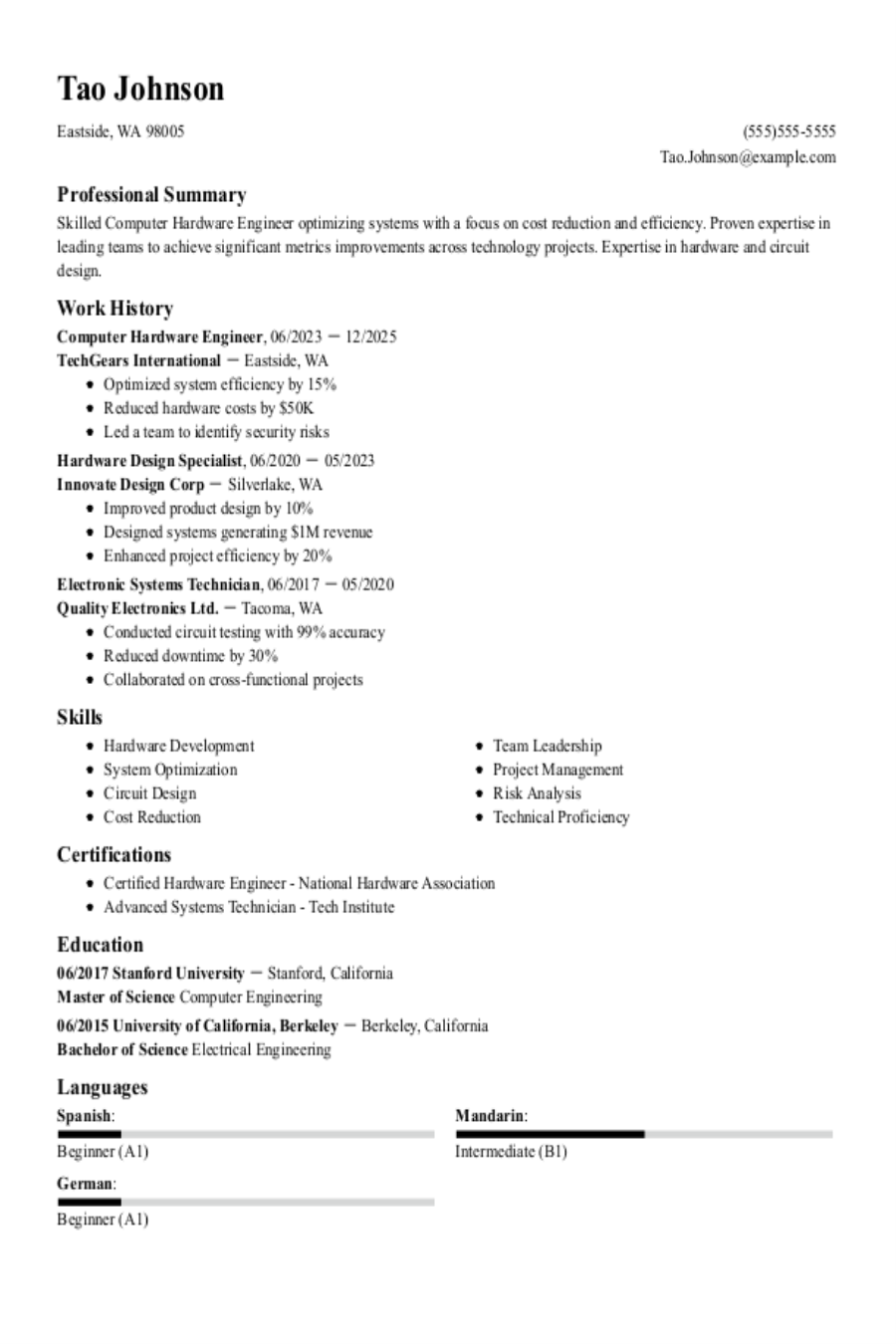Popular Network Engineer Resume Examples
Entry-level network engineer resume
An entry-level resume for a network engineer should focus on relevant technical skills, certifications, academic projects, and internships to effectively show you have the skills despite limited professional experience.
Relevant skills: The resume effectively highlights essential skills, from LAN/WAN management to firewall configuration, showcasing well-rounded abilities that support the job seeker's qualifications for network engineering roles.
Focus on goals: Demonstrates a proactive approach to career development through hands-on experience in network optimization and cybersecurity, significantly contributing to system performance improvements and effective team leadership.
Mid-career network engineer resume
A mid-career network engineer resume should emphasize a mix of technical expertise and hands-on project experience to show professional growth and adaptability in the ever-evolving tech landscape.
Powerful resume profile: A well-crafted professional summary highlights the network engineer's extensive experience in optimizing and securing network systems. This summary helps recruiters and ATS to swiftly recognize key qualifications.
Balanced skills section: This resume effectively highlights the applicant's technical expertise in network engineering while also showcasing their communication and leadership skills, illustrating a well-rounded professional profile.
Experienced network engineer resume
An experienced network engineer resume should emphasize technical skills and certifications while clearly outlining key projects and achievements that demonstrate a commanding expertise in the field.
Organized template: This job seeker uses a clean design that includes a professional header and an ATS-friendly resume layout. A well-organized resume ensures recruiters grasp the skills immediately and automated systems can seamlessly parse the content.
Modern style: This modern resume template showcases the applicant's creative spirit as well as their commitment to excellence, highlighting an ability to deliver effective technological solutions in a competitive environment.
No experience network engineer resume
A resume for an applicant with no experience should highlight relevant skills, certifications, and any hands-on projects or coursework to showcase the job seeker's technical abilities and potential to succeed in the role.
Emphasis on professional skills: By showcasing hands-on technical skills and volunteer experience, the job seeker clearly demonstrates their readiness to take on a network engineer role, despite limited professional background.
Simple style: The resume's clean design effectively highlights qualifications through concise descriptions of relevant experience, education, and accomplishments, ensuring a focus on content without unnecessary visual distraction.
More resume examples
Network Engineer Resume Template
Kickstart your resume with this versatile network engineer template—easily adapt it to showcase your skills and experiences, making it uniquely yours.
David Wang
Cedar Valley, MN 55133
(555)555-5555
David.Wang@example.com
Professional Summary
Accomplished Network Engineer with expertise in optimizing networks, enhancing security, and reducing downtime. Proven track record in managing complex network systems to improve performance and achieve significant cost savings.
Work History
Network Engineer
TechNet Solutions - Cedar Valley, MN
April 2023 - August 2025
- Managed 50+ network systems upgrades
- Reduced downtime by 30% via optimization
- Configured high-performance routers
Systems Network Specialist
Digital Connect Corp - Cedar Valley, MN
January 2019 - March 2023
- Enhanced network security by 20%
- Monitored network traffic, reducing latency
- Implemented IP telephony protocols
IT Network Technician
WaveTech Innovations - Minneapolis, MN
January 2017 - December 2018
- Executed 200+ server deployments
- Troubleshot connectivity issues rapidly
- Optimized LAN/WAN configurations
Skills
- Network Security
- Router Configuration
- Firewall Management
- LAN/WAN Optimization
- IP Telephony
- VPN Setup
- Network Troubleshooting
- Cloud Networking
Certifications
- Cisco Certified Network Professional (CCNP) - Cisco Systems
- Certified Information Systems Security Professional (CISSP) - ISC²
Education
Master of Science Network Engineering
Stanford University Stanford, California
June 2016
Bachelor of Science Computer Science
University of California, Berkeley Berkeley, California
June 2015
Languages
- Spanish - Beginner (A1)
- Mandarin - Beginner (A1)
- French - Intermediate (B1)
Must-Have Skills on a Network Engineer Resume
A strong skills section is important for showcasing your qualifications effectively on a resume.
IT and data professionals keep systems running and information flowing. The skills you highlight should reflect your ability to support complex processes, solve challenges, and contribute to smart, secure operations. Your resume is your opportunity to show how you enable efficiency, reliability, and informed decision-making.
The following data highlights the essential hard and soft skills commonly sought after for network engineering roles, based on insights from Resume Now’s extensive resume database.
When you’re ready to improve your resume with relevant skills, try our AI Resume Skills Generator. It identifies both hard and soft skills tailored to your job title, ensuring you create a comprehensive and targeted skill set.
Writing Your Network Engineer Resume
Having reviewed some effective resume examples, you’re now prepared to make your own. We'll guide you through the process step by step, showing you how to write a resume that stands out.
List your most relevant skills
Want to write a strong skills section for your resume? Focus on highlighting both technical competencies—such as routing protocols and network security—and essential soft skills like teamwork and analytical thinking. By aligning your skills with those listed in the keywords from the job listing, you demonstrate that you're the right fit for the role.
Using these keywords not only makes it easier for human recruiters to see your suitability but also improves your chances of passing through applicant tracking systems. When these systems scan resumes, they look for specific terms related to network engineering, such as "TCP/IP" or "firewall management." Including these keywords will help you land your next role.
Example of skills on a network engineer resume
- Proficient in configuring and troubleshooting network hardware and software
- Skilled in implementing security measures to protect sensitive data
- Excellent communicator capable of collaborating with diverse teams
- Analytical thinker with a strong focus on problem resolution
Highlighting your soft skills on your resume can set you apart from other job seekers. Employers greatly value interpersonal abilities because they are often challenging to develop later in your career, making them a significant asset in any team environment.
Highlight your work history
Your work experience section is the core of your resume. Your work history should highlight your responsibilities as well as your achievements in the field. By showcasing specific successes, such as projects you've completed or problems you've solved, you'll prove you've applied your technical skills and contributed in the real world.
When detailing each job entry, include your title, the employer's name, and the dates of employment. This information helps establish professional credibility and helping hiring managers assess your background. Make a point to include any relevant certifications or technologies you worked with that are relevant to the position you're applying for.
Example of a network engineer work experience entry
- Network Engineer
Tech Solutions Inc. - San Francisco, CA
January 2021 - Present - Design and implement scalable network architectures that support company growth, improving overall system performance by 30%
- Monitor network performance and troubleshoot issues using advanced diagnostic tools, reducing downtime by 25% through proactive maintenance
- Collaborate with cross-functional teams to integrate new technologies, improving security protocols and increasing data protection measures by 40%
- Lead training sessions for junior engineers on best practices in network management and cybersecurity, boosting team efficiency by 15%
- Document network configurations and updates carefully to ensure compliance with industry standards and streamline future upgrades.
When crafting resume bullet points, aim for impact. Start with a strong action verb, then include quantifiable results or specific skills. This way, you provide enough detail to show your value without overwhelming the reader with excessive information.
Include your education
The education section of your resume should be organized in reverse-chronological order, showcasing your most recent academic achievements first. Include degrees, diplomas, and any relevant certifications while omitting your high school diploma if you have completed a higher level of education. This focus on higher qualifications helps to highlight your expertise and readiness for the role.
If you are currently enrolled in a program or have incomplete credentials, be sure to list your highest completed degree along with an expected graduation date. It can also be helpful to include bullet points that outline relevant coursework or projects that demonstrate your technical skills and knowledge relevant to network engineering. This detail is especially important for recent graduates or those still studying, as it reinforces foundational skills.
Common certifications for a network engineer resume
- Cisco Certified Network Associate (CCNA) – Cisco Systems
- CompTIA Network+ – CompTIA
- Certified Information Systems Security Professional (CISSP) – ISC²
- Juniper Networks Certified Associate (JNCIA-Junos) – Juniper Networks
Sum up your resume with an introduction
Creating a strong profile section in your resume is essential for making a lasting first impression on employers. This section serves as your introduction, giving potential employers a glimpse into your professional identity and what you can offer the company. A strong profile can set the tone for the rest of your resume, capturing attention and encouraging further reading.
When crafting this crucial section, you have two main options: a professional summary or a resume objective. A professional summary highlights your existing experience, skills, and accomplishments—focusing on what you've already achieved. A resume objective emphasizes your career goals and what you hope to gain from the position. Understanding which approach aligns with your career stage can significantly impact how effectively your resume communicates your value to potential employers.
Professional summary example
Dynamic network engineer with over 8 years of experience in designing and implementing robust network solutions. Demonstrated success in optimizing network performance, improving security protocols, and reducing downtime through proactive maintenance. Expert in routing, switching, and firewall configurations to ensure seamless connectivity and high availability.
Resume objective example
Enthusiastic network engineer eager to use foundational knowledge in networking protocols and troubleshooting to support a forward-thinking IT team. Committed to improving system performance and security while facilitating seamless communication across networks through strong analytical and problem-solving skills.
Keep resume profile concise yet packed with relevant information. Aim for no more than three or four sentences that highlight your key skills and experiences. You can elaborate on any additional details in your cover letter, allowing you to maintain a focused and effective resume.
Add unique sections to set you apart
Including optional resume sections can improve your chances of landing an interview. These sections allow you to showcase unique qualifications that set you apart from other applicants.
By highlighting relevant hobbies or volunteer experiences, you provide potential employers with insight into your personality and values. For example, if you've participated in community tech workshops or contributed to open-source projects, it illustrates your passion for technology and commitment to continuous learning. Such details not only demonstrate your technical skills but also reveal important soft skills like teamwork and leadership that are vital in the networking field.
Three sections perfect for a network engineer resume
- Technical skills: Technical skills showcase your expertise in essential areas such as networking protocols, security, and troubleshooting. Highlighting these skills helps potential employers quickly assess your qualifications and fit for the role.
- Tools and platforms: In today's tech landscape, strong computer skills are essential. Being skilled in software, tools, and platforms improves efficiency in network management, troubleshooting, and implementation, ensuring robust performance and security.
- Professional certifications: Certifications showcase your expertise and dedication in networking. Highlight relevant certifications, the issuing bodies, and completion dates to improve your credibility and career opportunities in this competitive field.
5 Resume Formatting Tips
- Choose a format that matches your career stage.
When deciding on the appropriate resume format, take into account your career level. A chronological format works well to showcase growth and achievements if you've accumulated several years of experience. For individuals starting their careers, a functional resume emphasizes skills instead of work history, helping highlight potential more effectively. Alternatively, a combination format offers a well-rounded view of your qualifications.
- Pick a smart resume template.
Using a professional resume template can make your resume more compelling. Templates allow you to present your skills and experiences clearly, making it easy for potential employers to scan your information.
- Use an appropriate font.
When crafting your resume, opt for clean, professional fonts such as Helvetica, Georgia, or Verdana. These fonts improve readability for both applicant tracking systems and hiring managers, ensuring your qualifications shine without distraction.
- Use consistent formatting.
Align your resume text to the left and maintain uniform margins to create a clean, professional look that improves readability and leaves a positive impression on employers.
- Keep your resume to one or two pages.
In general, resumes should be one page long. Keep your content concise and focused on the key achievements and skills that will grab an employer's attention. If you have extensive experience, a two-page format might be acceptable.
Tools for Your Job Search
Are you gearing up to apply for that exciting network engineer position? Before you submit your application, take advantage of our ATS Resume Checker. This tool provides valuable insights into how well your resume can navigate the automated systems that many tech companies use for initial screening, ensuring you make a strong first impression.
Looking for tailored support in crafting your resume? Our AI Resume Builder is designed just for you. It offers personalized content recommendations specific to your network engineering background, along with professionally crafted templates that effectively showcase your technical skills and experiences.
Frequently Asked Questions
Last Updated: August 22, 2025
Absolutely. A cover letter is an opportunity to add context to your resume. Cover letters serve as an additional platform for you to connect with potential employers and express your enthusiasm for the network engineer role. Don't hesitate—write a cover letter that showcases your unique qualifications.
To avoid the hassle, consider using our AI Cover Letter Generator. This tool quickly helps you create a tailored, strong cover letter in just minutes. Plus, you'll find several cover letter template options that perfectly align with your resume, ensuring a professional and cohesive application package.
A resume is generally a concise document, usually spanning one to two pages, while a curriculum vitae (CV) can extend several pages and offers detailed insights into your academic background, research contributions, and professional experience. This thorough approach makes CVs suitable for presenting a complete picture of your qualifications.
You should use a CV when applying for specialized positions in academia, science, law, or medicine. If you find that you need to prepare a CV for your desired role, our online CV Maker is an excellent resource. It allows you to create tailored CVs quickly and efficiently by choosing from various CV templates designed for different industries and career levels—making the process simple and effective.
Selecting the right resume format hinges on your career stage and individual strengths. For those just starting out, a functional resume is ideal as it highlights skills over experience. Conversely, seasoned professionals should opt for a chronological format, showcasing their work history and achievements prominently. Mid-level job seekers may find that a combination format works best, integrating both skills and experience to present a well-rounded picture to potential employers.
To craft a standout network engineer resume, opt for a modern, professional template. Incorporate relevant keywords from the job description to demonstrate your qualifications and increase your chances of catching an employer's attention.
To ace your network engineer interview, practice job interview questions and answers. This preparation not only boosts your confidence but also equips you to handle any curve balls that come your way. Remember, preparation is key to success!
Was this information helpful? Let us know!
Hailey is a career advice writer dedicated to helping job seekers excel in their careers.
More resources

Summary of Qualifications: 13 Examples for Your Resume
Our guide will help you write a summary of qualifications that...

How to Write a Cover Letter in 2025
A great cover letter will impress employers and get you hired....

Cost of Living Crunch: 92% of Americans Cut Back Spending in 2025
Resume Now s survey reveals a cost of living crisis that has l...

Billing Resume: Examples & Templates
As a billing professional you need a resume that captures the...

Interview-Winning Computer Software Resumes Examples and Tips
As a computer software professional your resume should showca...

Computer Hardware Resume: Examples & Templates
As a computer hardware professional you need a resume that sh...

